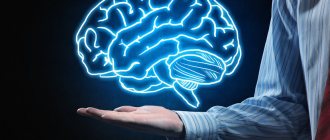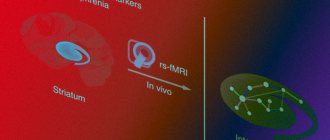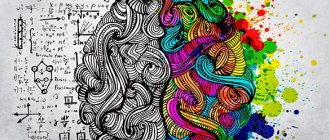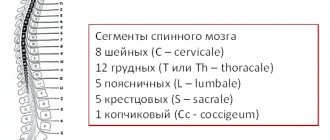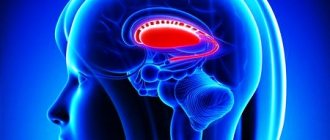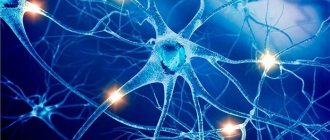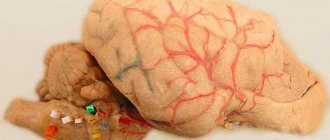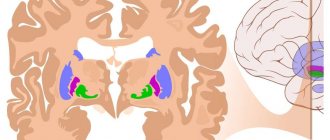Did you know that craters on the Moon were discovered before they discovered that the human brain is divided into separate sections, each with its own specialization? And at present, this unique tool for controlling our body continues to retain many of its secrets. And scientists studying its functions are still surprised as they discover more and more new properties and features of brain activity. A striking example of such unexpected discoveries is the functions of the hippocampus, a small paired formation in the temporal lobes of the cerebral hemispheres.
One of the oldest parts of the brain
The hippocampus arose at the dawn of the evolution of vertebrates and went through a long development path, becoming an extremely important part of the structure of the human brain. It got its slightly strange name due to its curved shape, reminiscent of a seahorse, and the literal translation of this concept is “curved horse.”
The hippocampus is a paired organ; its parts are located in different hemispheres, but are connected by special nerve fibers. Relatively small “squiggles” of the hippocampus are part of the oldest region of the brain - the limbic system, which is also called the archeocortex - “ancient cortex”. It controls elementary physiological processes and vegetative functions. We can say that the limbic system is what our brain has in common with all mammals.
The hippocampus is still ancient, but despite its small size, it is not a primitive formation at all. And he has just begun to reveal his secrets.
Effect on emotions
The relationship between the hippocampus and human emotions has not yet been sufficiently studied. Since it is located next to the amygdala of the brain, this suggests its influence on this type of mental state. According to experiments conducted on animals, the function of the hippocampus in this case is expressed in assessing the novelty of external stimuli.
Thus, when the temporal lobes of the brain are removed along with the amygdala and hippocampus in monkeys, it results in them losing their sense of fear and aggressiveness. Such animals are not able to distinguish important external signals from unimportant ones, as a result of which their defensive reaction decreases.
Multifunctionality of the hippocampus
Back in the 16th century, the Italian anatomist Giuseppe Aranzi (Arantius) drew attention to two small paired sections of the brain, similar to seahorses. We owe this scientist not only the concept of “hippocampus”. Arantius suggested that this part of the brain is responsible for the perception of smells, and until the end of the 19th century, physiologists called it the “olfactory brain.” Only in 1890, the famous Russian physiologist V. M. Bekhterev published the results of studies in which he proved the connection of the hippocampus with the processes of memorization and retention of information.
Memory management
Small compared to the rest of the brain, the “squiggles” of the hippocampus control the complex processes of short-term memory and the movement of processed information into long-term memory. That is, we owe all our professional knowledge and skills, childhood memories, stored information about significant life events and the faces of friends and loved ones to the hippocampus.
However, how the memory management process occurs still remains a mystery. But the very location of the hippocampus is such that it is connected to all parts of the brain, where it distributes everything that needs to be remembered and stored.
This part of the brain is responsible for emotional memory, that is, the storage of emotions and feelings. This is perhaps one of the oldest types of memory, and it is the most durable. We may forget the details of an event, the features of the people involved in it, but the memory of the feelings we experienced remains for a very long time.
Studies have shown that the hippocampus is also responsible for memory for faces. This is also a very important type of memory, which in ancient times also played a protective function, because it was very important to quickly distinguish an enemy from a friend.
In addition, the hippocampus is engaged in a kind of sorting of information, weeding out the insignificant or unimportant, and sending the necessary ones for long-term storage to other parts of the brain, which are responsible for a variety of types of memory. This sorting occurs primarily during sleep. I think you have heard that when preparing for an exam, when you need to remember a large amount of information, it is useful to sleep during the day. This is precisely due to the mode of operation of the hippocampus, which processes and sorts information received by the brain while a person is sleeping. During wakefulness, this part of the brain has many other important responsibilities. For example, orientation in space.
Spatial orientation function
A person is constantly in diverse relationships with the world around him. These relationships, as a rule, include various motor operations and complex actions associated with orientation in space. Without the ability for such orientation, we will not even be able to lift a spoon to our mouth or sit on a chair. The hippocampus also controls all this. Even our three-dimensional perception and functioning in the 3D world is his merit.
The hippocampus stores all impressions and sensations associated with the perception of the surrounding space in memory as an important experience. Spatial memory allows us to navigate even in a completely unfamiliar environment, to correlate the sizes of objects, their essence and distance to them. For example, the ability to navigate the terrain allows us to understand that a hole in the road is dangerous and needs to be avoided, even if we are walking along this road for the first time and have never seen this hole. By the way, the fact that we can recognize and identify different objects, despite our spatial position and speed of movement, is also a merit of the hippocampus. Thus, we perceive a chair the same way, regardless of whether we are sitting on it, standing next to it, lying on the floor, or walking past it.
Recent studies have shown that the hippocampus not only controls the neurons responsible for the perception of space, but also stores unique neural maps of the places where we have been. And in people whose profession requires good spatial memory, for example, taxi drivers, the hippocampus is often larger than in those for whom storing information about the area is not so important.
Neuron Factory
For a long time it was believed that the bulk of neurons - nerve cells of the brain - are formed in childhood, and in adults they can only die off as a result of nervous overload and old age. I think everyone has heard the phrase “nerve cells do not recover.”
It turned out that this is not true at all. Neurons are reproduced, that is, “born” throughout a person’s life, and with proper mental activity (when a person thinks, solves complex problems, is engaged in creativity), they are included in the activity of the brain. True, with age, the rate of creation of new nerve cells decreases, but the lifespan of existing ones increases.
So, the main factory for the production of neurons in the brain is also the hippocampus. Every day it “produces” about 700 nerve cells. This process, called neurogenesis, was discovered relatively recently and has so far been little studied.
There is an assumption that the functions of the hippocampus are not limited to this. Its role in the functioning of the brain is enormous, which is also proven by the problems that arise when the functioning of this relatively small part of our “central computer” is disrupted.
Effect of drugs
Drug intensification of hippocampal functions is carried out using the following groups of drugs:
- nootropics (used to eliminate memory impairment);
- anxiolytics (reducing anxiety);
- anticonvulsants (for the treatment of epileptic seizures);
- neuroprotectors (protection of nerve cells from death due to oxygen starvation and excess calcium ions).
A special place in stimulating the hippocampus is occupied by those drugs that can change the level of acetylcholine, a neurotransmitter responsible for some physiological reactions (muscle contraction, heart rate and blood pressure), as well as attention and learning. These drugs can have both a direct effect on the concentration of this substance (anticholinergics, cholinomimetics) and an indirect effect on the enzymes involved in suppressing its activation (cholinergic drugs). It is known that during learning, the level of acetylcholine in the brain first gradually increases and then decreases. The introduction of substances with acetylcholine can improve the cognitive process.
Consequences of damage to the hippocampus
Disturbances in the activity of the human brain can be caused by three groups of reasons:
- injuries;
- mental illness;
- neurodegenerative processes caused by drug and alcohol use or associated with aging.
Almost all of these factors in one way or another affect the activity of the hippocampus, which leads to disruption or loss of a number of important mental functions.
Memory impairment
Most memory problems occur when the hippocampus is damaged or its activity is disrupted. We are talking here not about banal forgetfulness and absent-mindedness, but about serious pathologies. These include two main types of partial memory loss:
- Retrograde amnesia is the loss of memory of events preceding an injury or illness.
- Anterograde amnesia is the forgetting of what happened after an accident or illness.
In both cases, only declarative memory is lost, based on generalizing our experience, recognizing events, faces, etc. This is the sphere of conscious memories, which is controlled by the hippocampus. As already mentioned, this part of the brain is associated with the transfer of information from short-term memory to long-term memory, and damage to the hippocampus leads to disruption of this process. As a result, either access to data stored in long-term memory is blocked (retrograde amnesia), or long-term storage of newly received information becomes impossible - anterograde amnesia.
Psychopathology
The hippocampus is not only a very important, but also a vulnerable part of our brain. With various mental illnesses caused by genetic pathologies, stress, use of psychotropic drugs or aging, he suffers first.
Despite the insufficient knowledge of the functions of the hippocampus, its connection with some mental disorders has been established quite accurately:
- Epilepsy. Studies have shown that pathologies or deformations of the hippocampus were identified in 75% of patients with epilepsy.
- Alzheimer's disease. This disease, characteristic of older people, is associated with dysfunction of the hippocampus, which even decreases in volume. And the symptoms of Alzheimer's disease indicate its connection with disruption of this part of the brain. These include memory impairment and problems with orientation in space, and with deep pathology, the inability to recognize the faces of loved ones.
- Korsakov's syndrome, which can be either alcoholic or non-alcoholic, associated, for example, with a brain tumor, trauma, vascular disorders in old age, etc. This disease is characterized by the inability to remember events of the present and disorientation in space, time, occurring events.
One of the factors affecting the functioning of the hippocampus is prolonged stress, which leads to rapid and massive death of neurons. The hippocampus, which is responsible for their reproduction, simply cannot cope with the load. The hormone cortisol, which is produced in large quantities during stress to activate the body's activity, stimulate the muscular and vascular system, etc., is also involved in the destruction of cells in this part of the brain. The main side effect of cortisol on the brain is disruption of the hippocampus, which leads to to memory impairment, absent-mindedness, disorientation in space.
This is why it is so important to avoid prolonged stressful conditions. But if going into the forest and living in a secluded hut on the shore of a lake is not your option, then you should learn to manage your emotions and remain calm.
Behavioral inhibition
Experiments on animals in which the hippocampus was damaged showed that not only were the responses that had been studied previously suppressed, but that changes in behavioral inhibition also occurred. They manifest themselves in three interrelated processes:
- inhibition of the predominant reaction to any event;
- deferment of decision;
- event protection.
The coordinated and correct flow of these mechanisms protects against overload with external distractions and impulsive manifestations. In animals with a violation of this function, hyperactivity occurs.
